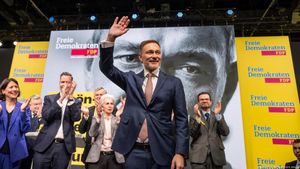Germany’s federal election on February 23, 2025, marked a pivotal moment for the country’s political future, as the conservative Christian Democratic Union (CDU) emerged victorious, poised to lead under Friedrich Merz. This noteworthy election saw nearly 60 million eligible voters grappling with pressing economic concerns and increasing anxiety over migration, culminating in significant shifts within the political arena.
Incumbent Chancellor Olaf Scholz, representing the Social Democratic Party (SPD), acknowledged his party's defeat, admitting it was a "bitter election result for the Social Democratic Party, it is also an electoral defeat," during his first remarks following the vote. Scholz’s party garnered only 16.5% of the votes, marking the SPD’s worst performance since World War II. On the other hand, Merz's CDU/CSU bloc secured approximately 28.5% of the vote, celebrating their successful campaign which focused on issues such as immigration and economic stability.
High voter turnout characterized this election, significantly up from previous years; it hinted at the electorate's urgency to effect change. Merz, who will take on the chancellorship for the first time, urged voters on social media by saying, “Every vote counts now. I ask for your trust. Send a signal in favor of the political change,” as he stood alongside his wife, Charlotte, at their polling station.
Another standout moment was the far-right Alternative for Germany (AfD), which has steadily gained traction and secured 20% of the vote, its highest result to date. This party has been the center of much controversy and debate, and its rise reflects changing public attitudes toward migration, especially following heightened fears rooted in recent violent incidents tied to asylum seekers.
Voting was calm throughout Berlin, with officials reporting smooth operations at polling stations. Many voters expressed hope for change under new leadership, particularly those who felt sidelined by the previous government. A middle-aged voter noted simply, "I hope things improve after this election, also for Europe."
Despite the lower support for the traditional parties, some voters like Nicholas, 35, remain stalwart SPD supporters, believing their party offers the best chance to combat far-right influences.
The challenges facing the incoming government cannot be understated. Merz will need to engage in complex coalition talks, as the fragmented political environment creates hurdles for forming cohesive governance. The Free Democratic Party (FDP) hovered around the 5% threshold to enter parliament, creating uncertainty for potential coalitions, and the Greens and far-left parties could also influence negotiations.
Political analysts, like Michael Broening, remarked on the stakes of the election, stating, "The stakes could not be higher," emphasizing the urgent need for traditional parties to regain the trust of disaffected voters who have leaned toward far-right ideologies. The trend of increasing vote share for the AfD has compelled mainstream parties to reassess their strategies and address public concerns around migration, security, and economic resilience.
A retired voter, Helmut, expressed his perspective: "It was difficult to govern with three parties, and the Free Democratic Party blocked everything. I'm worried about a shift to the right, but I trust it won't happen."
Yet, there remains skepticism about the potential for the AfD to gain greater power, as their historic results pressure other parties to confront their stances on important issues.
After this election, the path forward for Germany will undoubtedly hinge on coalition-building, which is anticipated to be arduous. The CDU’s Merz has pledged to enact strong leadership, calling for increased intensification of policies around immigration and investment to energize Germany’s economy and tackle pressing public concerns. The next several weeks will see negotiation dynamics tested as Schmidt’s government transitions to caretaker mode.
Despite the significant changes within the political milieu, many voters remain cautious yet hopeful for the incoming government’s ability to provide stability and direction amid uncertainties. The election has authored its own narrative of change within Germany, with voters eager to see how Merz’s leadership will reshape national policies and influence Germany's role within Europe.
Historically, these elections serve as focal points for broader European political trends, and all eyes will be on Germany as it navigates through these turbulent waters of political transformation and public sentiment. There is every chance the forthcoming government will need to face not just domestic concerns, but also growing European anxieties tied to migration and economic stability.



